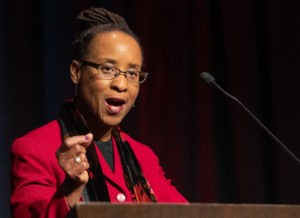Some have likened the current time in the United Methodist Church to the biblical exodus of Hebrew slaves from Egypt. Others have found a parallel in the Israelites’ exile in Babylon. Still others see the UMC living through the same kind of uncertainty and promise that the earliest Christians did in the first century after Christ.
The mix of references symbolizes United Methodists’ struggle to get a handle on today’s fractious and frustrating interim as the denomination lurches toward a twice-delayed global conclave that may decide the UMC’s fate. Both the delay and the uncertainty are grinding down the spirits of many United Methodists who just want to get on with an expected split, so they know which direction to go.
As with the Exodus, when the “back-to-Egypt” faction stirred former slaves to idolatry while waiting for Moses to bring God’s law down from the mountaintop, some groups are hammering at existing fractures in attempts to break away ahead of a formal decision to divide the UMC. Since a special General Conference in 2019 tightened the UMC’s bans against same-sex marriage and LGBTQ clergy, a growing number of congregations have taken advantage of a lengthy and financially expensive process to leave the denomination, as Heather Hahn of UM News wrote earlier this year. However, other dissidents of many theological stripes have simply refused to comply with UMC rules.
Both the delay and the uncertainty are grinding down the spirits of many United Methodists.
Conflict in Georgia
Currently, the most prominent of these disputes is between Mt. Bethel United Methodist Church in Marietta, Ga., and its regional authority, the North Georgia Annual Conference. Mt. Bethel’s leadership announced its intention to leave the UMC in April when its senior pastor, Jody Ray, refused a new appointment from Bishop Sue Haupert-Johnson to become the conference’s racial justice coordinator. Ray turned in his United Methodist clergy credentials and was independently hired as pastor and CEO by Mt. Bethel’s administrative board.

Bishop Sue Haupert-Johnson
Although Bishop Haupert-Johnson appointed a new senior pastor, Steven Usry, to Mt. Bethel as of July 1, Usry has been refused access to the church property by the entrenched leadership. After weeks of acrimonious allegations flung in both secular and church media by the congregation and the conference, the two parties entered mediation in August.
The North Georgia Conference announced Sept. 8 that mediation had failed and that its board of trustees had filed suit in civil court to assume ownership of all Mt. Bethel property, including an affiliated Christian school that the conference said the church started without proper sanction. The conference asserted its authority to invoke United Methodism’s “trust clause,” a legal framework in which all church property is deemed to be held “in trust” by a local congregation for its regional unit, the annual conference. With rare exceptions, the trust clause has been affirmed in civil courts for decades.
Wesleyan Covenant Association
Behind the public dispute lies Mt. Bethel’s affiliation with the breakaway Wesleyan Covenant Association, an organization of “traditionalist” United Methodists who plan to start a new denomination, the Global Methodist Church. For months the WCA has been railing against three United Methodist bishops — Grant Hagiya of California-Pacific Conference, John Schol of Greater New Jersey Conference and Haupert-Johnson — for attempting to move WCA-friendly pastors from churches aligned with the organization. (Bishops appoint pastors in the UMC rather than congregations hiring their own pastors).
In the cases of Hagiya and Schol, both attempted to move Korean American pastors from their ethnic congregations. Hagiya faced rare public demonstrations in May for his decision but declined to explain his rationale for the move, according to Sam Hodges of UM News. Schol issued a lengthy rebuttal denying any anti-WCA bias in his decision.
Until General Conference decides whether and how to break up the worldwide denomination, clergy and congregations are still bound by current doctrines and laws in the Discipline.
In all three personnel disputes, experts such as Anne L. Burkholder, associate dean at UMC-related Candler School of Theology in Atlanta and co-author of Quick and Easy Guide to United Methodist Polity, say the bishops acted within their authority. In Haupert-Johnson’s case, church charges filed against her for attempting to reassign Ray were dropped in early September when the UMC’s Southeastern Jurisdiction College of Bishops and its Episcopacy Committee found she had acted with proper authority.
Therein lies the rub that’s acutely chafing some United Methodists: Until General Conference decides whether and how to break up the worldwide denomination, clergy and congregations are still bound by current doctrines and laws in the Discipline.
Breaking the cycle
In the previously normal UMC life cycle, the Discipline was amended every four years by General Conference. The denomination appeared headed for a split in 2020, some five months after an independently negotiated agreement called the “Protocol for Reconciliation & Grace Through Separation” was scheduled to be decided at General Conference. Since the coronavirus pandemic hit, General Conference organizers twice have postponed the global conclave citing the threat of COVID-19 infection among delegates. Thus, pandemic stresses have added to United Methodists’ anxiety over their collective future.
While their theological differences are straining the UMC to the point of noticeable fractures, some United Methodists are attempting to look beyond current strife. Striving to sing the Lord’s song in a strange land, some groups have attempted to discern a path through the fog of possibilities.
Tops among these efforts since early January have been virtual workshops on how to conduct “hybrid” worship combining in-person participation with livestream access, or “both/and” models as described by one of the most active workshop leaders, Jason Moore of Midnight Oil Productions. “Hybrid” worship is proving to be one practical way that ever-pragmatic United Methodists are making their way during this interim, but even this option has been slowed by the resurgence of COVID-19.

Kennetha J. Bigham-Tsai addresses the 2020 Pre-General Conference Briefing in Nashville, Tenn. (Photo by Mike DuBose, UM News.)
Last April, the Connectional Table, a sort of churchwide ministry council, unanimously approved a proposal to host discussions around the world about the UMC’s future. Led by its top executive, Kennetha Bigham-Tsai, the effort expands on work done by an informal group of General Conference delegates from the United States, Europe, the Philippines and Africa known as “Out of Chaos … Creation.” A General Conference delegate herself from the Michigan Annual Conference, Bigham-Tsai also is part of the “Out of Chaos” group.
From Oct. 5 through Dec. 21, the Connectional Table will hold “Tuesdays at the Table: Should I stay? Or should I go?” — a series of discussions to be livestreamed at 10 a.m. Central time Tuesdays on Facebook. Recordings of the live sessions will be available at UMC.org/ComeToTheTable and the UMC YouTube channel.
“This new series seeks to help us think through the issues that are confronting our church,” Bigham-Tsai said. “As the church navigates the realities presented by tensions within the denomination and the global coronavirus pandemic, it is essential that United Methodists explore and understand who we are, what we believe and how we live as people of God.”
Those who long for a quick decision on United Methodism’s future are likely to remain dissatisfied at the latest developments. Like the wandering Hebrews and the exiled Israelites, the denomination’s fate rests with forces beyond the control of those in pew and pulpit.
Cynthia B. Astle is a veteran journalist who has covered the worldwide United Methodist Church at all levels for more than 30 years. She serves as editor of United Methodist Insight, an online journal she founded in 2011.
Related articles:
Analysts hope to help congregations understand the options with potential United Methodist split
Now there appear to be three paths for once-united Methodists
Top-down schism plans ignore local United Methodist churches’ new reality


